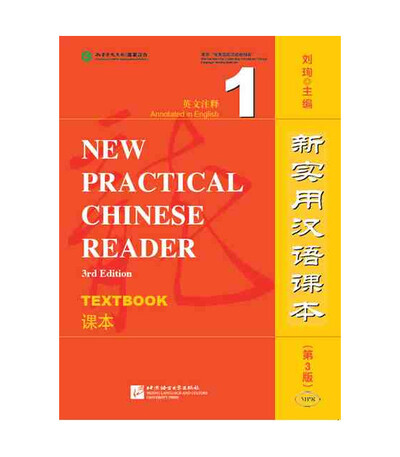- EAN13
- 9787561942772
- Éditeur
- BEIJING LCU
- Date de publication
- 31 décembre 2015
- Nombre de pages
- 312
- Dimensions
- 28,4 x 21,1 x 1,7 cm
- Poids
- 818 g
- Langue
- chi
New Pratical Chinese Reader 1, Textbook (3Ème Ed.)
Xun Liu
BEIJING LCU
Prix public : 39,90 €
Book Description As the second generation of the Practical Chinese Readerseries,New Practical Chinese Reader(NPCR) is a series of comprehensive Chinese teaching materials for adult students in countries other than China. The two generations together have exerted an influence in the international Chinese teaching circles for over 30 years. Its third edition centers on a few international students, telling interesting stories about their life and friendship with their Chinese friends and teachers in China. The revision regarding the third edition adheres to the aim of making it “easier to learn” for students and “more convenient to use” for teachers and maintains the pedagogy of “the integration of structure, function and culture”, striving to develop students’ comprehensive use of the Chinese language, especially the ability of cross-cultural communication, through the learning of language structures, functions and relevant cultural knowledge as well as the training in listening, speaking, reading and writing skills. New Practical Chinese Reader (3rd Edition) Textbook 1is composed of two preparatory lessons of Introduction to Phonetics and ten main lessons, including rich teaching content and tasks and activities on phonetics, vocabulary, grammar, Chinese characters and culture. About the Author Liu Xun is a professor at Beijing Language and Culture University (BLCU) and a chief editor and reviewer of Chinese textbooks in Beijing Language and Cultural University Press. Mr. Liu has successively served as a member of the National HSK Advisory Committee, a member of the TCSL Expert Advisory Committee of Hanban, a board member of World Chinese Teaching Association, a consultant of Chinese teaching for the New York State Department of Education, a visiting professor in Renmin University of China and Beijing Foreign Studies University, and a member and leader of the academic committee of BLCU. He once worked as a teacher in Ohio State University, University of Maryland, Middlebury College, and The Chinese University of Hong Kong, and gave lectures or academic reports in Australia, UK, Canada, Norway, Russia, Egypt, Thailand, Singapore, Macao and Taiwan among other countries and districts. Mr. Liu has won the Canadian TCSL Maple Award in 2014. His publications include monographs such as Introduction to Chinese as a Foreign Language Pedagogy, Introduction to Teaching Chinese as a Foreign Language, Brief Introduction to Teaching Chinese as a Second Language, An Overall View of Teaching Chinese as a Foreign Language, and widely popular CSL textbooks such as New Practical Chinese Reader, Practical Chinese Reader, and Chinese Textbook for Children. Mr. Liu has been awarded a special government allowance by the State Council of China. Editorial Review (1)Maintaining the features of the brand:Based on the characteristics of Chinese language teaching and the aim to solve the problem of “Chinese being difficult to learn”, the series sticks to the pedagogical idea of “combining structure, function and culture”. With the teaching of language structures as its basis, the series emphasizes the teaching of grammar, vocabulary, pronunciation and Chinese characters, and the language points are arranged in a way that strives to be scientific, systematic, progressive and repetitive so that students can master them easily. (2)An overall update of the content:The texts are more up-to-date, practical and fun. The texts in Textbook 1 have basically been rewritten, the functions being intensified, the topics more focused and the situations highlighted. As for the selection of new words, common words are paid more attention to and supplementary words are arranged in a theme-based way. (3)Stimulating independent learning:Two new sections, the pre-lesson “Warm-up” and post-lesson “Self-evaluation”, have been added. Classroom activities are given more emphasis and more communicative and task-based activities are included. Discovery learning and interactive learning are embodied to encourage students to summarize certain linguistic rules on their own. (4)Intensifying practice and application:The exercises are more pertinent to the language points. In every lesson, there are pronunciation drills, conversation practice, listening and repeating, reading comprehension, task and activity, writing exercise, etc., incorporating training in comprehensive language skills such as listening, speaking, reading, writing and translating and combining mechanical, communicative and task-based exercises in a more organic manner. Suggestion


















